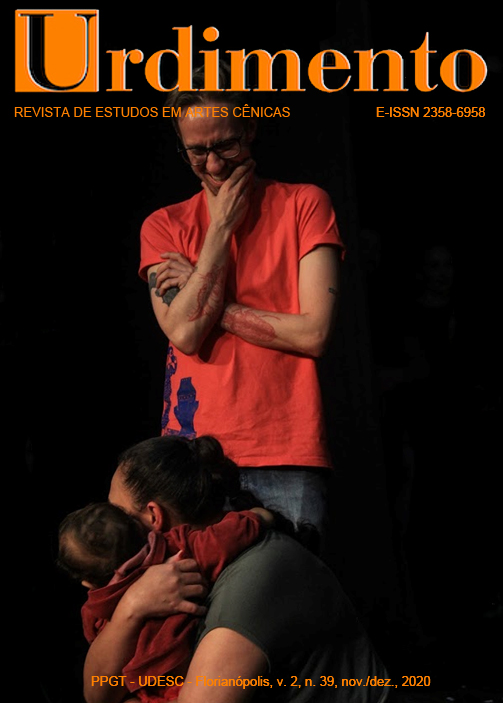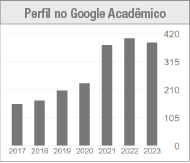O que acontece quando eu olho para você: o espaço íntimo do teatro na prisão
DOI:
https://doi.org/10.5965/14145731033920200111Palavras-chave:
Teatro na prisão, Artes prisionais, Voluntários na prisão, Reabilitação, Artes em correçõesResumo
Apesar dos crescentes estudos sobre teatro e voluntários em prisões, há pouca pesquisa que olha para a experiência teatral da prisão através dos olhos tanto dos voluntários externos quanto dos prisioneiros-participantes. Este artigo busca tecer as vozes coautorais para explorar experiências compartilhadas da sala de aula do teatro prisional. Essas experiências – descritas como "mágicas" e "transcendentes" – dependem do voluntariado realizando atividades com sucesso na prisão. O espaço da sala de aula do teatro na prisão torna-se então um refúgio relacional onde tanto os presos quanto os voluntários podem se sentir bem-vindos e aceitos, vistos não como outros, mas como essenciais.
Downloads
Referências
ABBOTT, J. H. In the Belly of the Beast: Letters from Prison. New York: Vintage Books, 1978.
ABRAMS, L., HUGHES, E., INDERBITZIN, M., & MEEK, R. (Eds.) The Voluntary Sector in Prisons: Encouraging Personal and Institutional Change. London: Palgrave Studies, 2016.
ARMSTRONG, R. Trusting the untrustworthy: the theology, practice, and implications of faith-based volunteers’ work with ex-prisoners. Studies in Christian Ethics, v. 27, n. 3, p. 299-317, 2014.
BREWSTER, L. The impact of prison arts programs on inmate attitudes and behavior: a quantitative evaluation. Justice Policy Journal, v. 11, n. 2, p. 1-28, 2014.
CHELIOTIS, L. (Ed.). The Arts of Imprisonment: Control, Resistance and Empowerment. Ashgate Publishing, 2012.
COHEN-CRUZ, J. Engaging Performance: Theatre as Call and Response. Florence: Routledge, 2010.
CREWE B., WARR, J., BENNETT, P., SMITH A. The emotional geography of prison life. Theoretical Criminology, v. 18, n. 1, p. 56-74, 2014.
CULLEN, F. The twelve people who saved rehabilitation: how the science of criminology made a difference. Criminology, v. 43, n. 1, p. 1-42, 2005.
DILLARD, A. The Writing Life. New York: Harper Perennial, 2013.
DWECK, C. Mindset: The New Psychology of Success. New York: Ballantine Books, 2006.
FESETTE, N. & LEVITT, B. Pedagogies of self-humanization: collaborating to engage trauma in the Phoenix Players Theatre Group. Teaching Artist Journal, v. 15, n. 3-4, p. 100-113, 2017.
FOUCAULT, M. Discipline and Punish: The Birth of the Prison. New York: Pantheon, 1977.
FOUCHÉ, C., & LUNT, N. Nested mentoring relationship: reflections on a practice project for mentoring research capacity amongst social work practitioners. Journal of Social Work, v. 10, n. 4, p. 391-406, 2010.
FREIRE, P. Pedagogy of the Oppressed. New York: Continuum International Publishing Group, 1970.
GOFFMAN, E. Asylums: Essays on the social situation of mental patients and other inmates. New York: Anchor Books, 1961.
HAMER, K. Navigating boundaries, weaving worlds: U.S. practitioners’ experiences of running theatre programmes in prisons. Cambridge, 2019. Thesis (Masters) – University of Cambridge.
LIEBLING, A. Can human beings flourish in prison? PPT Lecture, London, 29 mai. 2012. Dísponivel em: <http://www.artsevidence.org.uk/media/uploads/evaluation-downloads/can-human-beings-flourish-in-prison---alison-liebling---may-2012.pdf>
LUCAS, A. Prison Theatre and the Global Crisis of Incarceration. New York: Methuen Drama, 2020.
MORAN D. Carceral geography and the spatialities of prison visiting: visitation, recidivism, and hyperincarceration. Environment and Planning D: Society & Space, v. 31, n. 1, p. 174-190, 2013.
SIMPSON, E., MORGAN, C., & CAULFIELD, L. S. From the outside in: narratives of creative arts practitioners working in the criminal justice system. The Howard Journal of Criminal Justice, v. 58, n. 3, p. 384-403, 2019.
SMITH, C. What is a Person? Rethinking Humanity, Social Life, and the Moral Good from the Person Up. University of Chicago Press, 2010.
TEWKSBURY, R. & COLLINS, S. Prison chapel volunteers, Federal Probation, v. 69, n. 1, p. 26–30, 2005.
TEWKSBURY, R. & DABNEY, D. Prison volunteers: profiles, motivations, satisfaction. Journal of Offender Rehabilitation, v. 40, n. 1-2, p. 173-183, 2004.
TOFTELAND, C. The Keeper of the Keys. In: SHAILOR, J (Ed.) Performing New Lives: Prison Theater. London: Jessica Kingsley Publishers Ltd., 2011, p. 213-230.
TOMCZAK, P., & ALBERTSON, K. Prisoner relationships with voluntary sector practitioners. The Howard Journal of Crime and Justice, v. 55, n. 1–2, p. 57-72, 2016.
TURNER, V. Liminal to liminoid, in play, flow, and ritual: an essay in comparative symbology. Mediações: Revista de Ciências Sociais, v. 17, n. 2, p. 214–257, 2012.
VAN DER KOLK, B. A. The Body Keeps the Score: Brain, Mind, and Body in the Healing of Trauma. New York, NY: Penguin Books, 2014.
VAN MAANEN, K. Miss Spent: A drama project for young women at the Josephine Butler Unit, HMP Downview. Evaluation Report. Disponivel em: <http://www.clinks.org/assets/ files/Miss%20Spent%20report%20final.pdf>
ZELON, H. The Shakespeare redemption: Inmates in a Kentucky prison grapple with the truths of human existence. American Theatre v. 18, no. 8, p. 32–135,- 2001.
Downloads
Publicado
Como Citar
Edição
Seção
Licença
Copyright (c) 2020 Urdimento - Revista de Estudos em Artes Cênicas

Este trabalho está licenciado sob uma licença Creative Commons Attribution 4.0 International License.
Declaração de Direito Autoral
Os leitores são livres para transferir, imprimir e utilizar os artigos publicados na Revista, desde que haja sempre menção explícita ao(s) autor (es) e à Urdimentoe que não haja qualquer alteração no trabalho original. Qualquer outro uso dos textos precisa ser aprovado pelo(s) autor (es) e pela Revista. Ao submeter um artigo à Urdimento e tê-lo aprovado os autores concordam em ceder, sem remuneração, os seguintes direitos à Revista: os direitos de primeira publicação e a permissão para que a Revista redistribua esse artigo e seus meta dados aos serviços de indexação e referência que seus editores julguem apropriados.
Este periódico utiliza uma Licença de Atribuição Creative Commons– (CC BY 4.0)




